
Are you thinking of starting a travel agency? We have prepared a solid travel agency business plan template that guides you on every stage of your business plan writing.
Download Template
Are you a travel enthusiast and want to establish your own travel agency?
Well, if yes, then it’s an exhilarating journey of stepping into a world brimming with adventure and discovery.
But in the midst of this excitement, it’s necessary to lay the groundwork for a successful business out of a hobby. It demands a strategic roadmap – writing a proper travel agency business plan.
So, our travel agency business plan serves as the compass that directs you through all the intricacies of the industry and helps you pay attention to every detail of the business plan.
As you delve into this step-by-step guide, you can explore how to write your own business plan that sets the stage for sustainable growth and leaves a mark on potential investors or readers.
Without further ado; let’s dive into the art of crafting your travel agency business plan.
In reality, every established or emerging business requires a well-written business plan. It is not just a document; it’s a strategic blueprint, offering you a roadmap to make informed business decisions.So, starting your travel agency business greatly benefits from having a well-thought-out business plan like any other business.
Whether you’re looking to secure a loan or attract potential investors, a detailed business plan is truly helpful. It shows your agency’s capital cost & revenue potential and summarizes the profitability for angel investors.
An actionable plan provides a comprehensive view of your travel agency’s goals, offered services, and strategic steps you will take to achieve success. Also, it indicates a thorough understanding of your target audience and top competitors.
Drafting a professional business plan serves as a foundation for a successful business and helps you identify potential risks & challenges in the market. Through careful planning, you can create effective strategies to overcome obstacles.
A well-crafted business plan offers an internal guide that ensures your team understands and aligns with the overarching business objectives, encouraging a cohesive and immersed work environment.
Now, let’s move forward to write a successful business plan for a travel agency.
Before you start writing a travel agency business plan, it’s highly advisable to get a business plan template first!
It’s like having a valuable toolkit for your business planning endeavors. It not only streamlines the business plan writing but also ensures that you describe all the essential sections.
It offers a structured framework that helps you organize your thoughts effectively to draft a strategically sound business document according to your specific needs and preferences.
Beyond that, a quality business plan template lays the foundation for a comprehensive, professional business plan that highlights your business idea and vision to attract potential investors.
If you’re in search of a polished template, consider Upmetrics’ sample business plan template and ensure that you won’t overlook any essential points in your plan.

Free Business Plan Template
Download our free travel agency business plan template now and pave the way to success. Let’s turn your vision into an actionable strategy!
An executive summary is the first and foremost section of any business plan. It offers a quick overview of your entire travel agency business plan.
If your first few pages are compelling enough, potential investors or loan officers will find the document intriguing and delve further into your plan.
Your executive summary should be clear, concise, and engaging if you’re looking for investors or loan sanctions, as it will grab their attention and make a strong impression.
To draft an effective summary, start with a concise description of your travel agency business, covering its name, concept, location, objectives, and unique aspects. Refer to the below example:
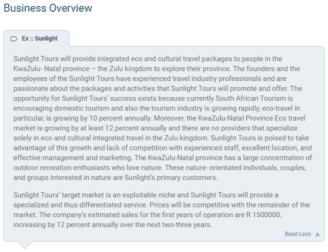
Next, explain what sets you apart and share insights about your service offerings, target market, and ideal customer base. Also, highlight marketing materials, current trends, and potential growth opportunities.
Lastly, give a summary of critical financial figures in terms of projected revenues, profits, and cash flows for the initial 3-5 years. From that, you can address funding needs and resources.
A business plan is a professional, living document that you should update regularly to reflect changes in your business.
Now, it’s time to draft a company overview section that provides a more detailed description of your travel agency.
It could be commercial travel agencies or online travel agencies. Share your agency’s founding story and the individuals behind its inception.
Try to explain your business legal structure(S-Corp, Limited Liability Company, or sole proprietorship), and describe the physical location of your travel agency.
Subsequently, highlight your vision and mission statement in this section to define your identity and core values. This serves as a brand story that your customers can connect to.
Take reference from the below example describing the mission statement of the travel agency:
Discuss a little bit more about your business background information and how your travel agency works. Try to give answers for when you start your business and how you have set your office space.
In addition, highlight any milestones you have accomplished, such as the number of clients served, positive reviews, new travel agency openings, etc.
An industry and market analysis section is one of the most important ones in your travel agent business plan. It explores your specific niche within the industry and the geographic background where you wish to operate.
So, take some time to go further and find more accurate information, such as who are your target customers & top competitors, what are the current trends, and whether the tourism market is increasing or decreasing.
Conduct a complete market analysis to study the market size and explore growth potential areas for travel agencies. Assess the total revenue generated within the travel industry and identify the emerging trends.
Examine your target market in detail, including demographics, travel behaviors, and customer preferences. Understand your ideal clients and tailor your services to satisfy their specific needs.
Do thorough customer research and understand how your target audience plans and experiences trips. This can help better customize packages and offerings to meet your clients’ needs.
Want help writing a target customer segmentation for your travel agency business? Use Upmetrics AI writing assistant now and easily draft your business plan sections:
As a travel agent, assemble a list of direct and indirect competitors in the travel agency industry. You can consider both classic brick-and-mortar travel agencies and online travel agencies.
Evaluate the strengths and weaknesses of each competitor, including service offerings, tour packages & quality, customer reviews, and marketing strategies.
Understanding these competitor factors will help you determine areas where your travel agency can differentiate itself and stand out in the competitive landscape.
Execute a SWOT analysis to find internal strengths & weaknesses of your travel company and external opportunities & threats in the travel industry.
Take reference from the below example showing a SWOT analysis for an XYZ travel agency business:
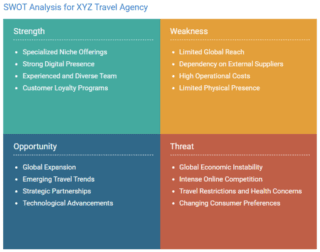
Based on SWOT analysis, formulate strategies to capitalize on opportunities and mitigate threats to outline competitive advantage.
Some extra tips for drafting this section of your travel company business plan:
Next, define the scope of your service offerings and clarify how they meet the diverse needs of your clients.
It must be informative, precise, and client-focused, as it is a detailed breakdown of different services that your travel company offers your customers.
As a travel agency, detail your service offerings, such as bookings, accommodations, vacation packages, international/domestic trips, custom-made business trips, or any cruise bookings.
Effectively disseminate your travel services with a detailed description of what it entails, service specifications, precise pricing plans, or any client reviews.
Here, you can take a reference from the below example to illustrate travel agency services:
1. Guided Tours
Our guided tours are led by knowledgeable local guides who provide valuable insights into the culture and history of each destination.
Price: Varies by destination, starting at [$50] per person
Specifications: Group sizes are limited to 15 people, and tours typically last 2-3 hours.
2. Accommodation Booking
We offer a range of accommodation options, from luxury hotels to charming bed and breakfasts, ensuring our clients have a comfortable stay.
Price: Varies by location and accommodation type, starting at [$100] per night
Specifications: Accommodations are vetted for quality, safety, and comfort.
Not only that, describe any specialized services in your travel agency business plan template that set your travel agency apart so investors can quickly understand your business scope.
In addition to planning & booking, highlight additional services (trip consultations, wedding planning, speaking at industry events, providing training to other travel agents) and mention third-party partners(if any).
Comprehensive sales & marketing efforts can help your business grow by leaps and bounds. Carry out market analysis and develop clear sales and marketing strategies for reaching your target customers.
For travel agency businesses, explain your preliminary approach and promotion tactics to acquiring either local or international customers.
Also, discuss affordable/high-quality travel packages you provide, their prices, and hassle-free transactions at the point of sale. Here are some of the sales and marketing strategies for travel agencies:
Emphasize the agency’s capability to offer personalized customer service, a variety of communication modes, and 24/7 customer support. Present exclusive access to unique destinations, experiences, and special perks.
Implement a flexible and competitive pricing plan that caters to a diverse client base. It allows the agency to adapt to market dynamics, provide value to customers, and uphold a profitable business.
Take reference from the below example written using Upmetrics’ travel agency business plan template:
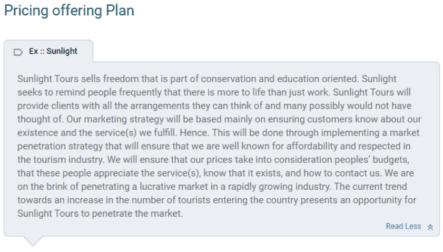
Create visually appealing brochures and distribute print materials to local businesses, travel agencies, and strategic locations. Implement a referral program and try to provide discounts or exclusive festive offers.
Utilize social media platforms(Facebook, Instagram, Twitter) to highlight travel packages, engage with the target audience, and build a community around travel enthusiasts.
Create a content marketing strategy comprising blog posts, travel guides, and visually appealing content to encourage potential customers to consider your agency for their travel needs.
Partner with local businesses, hotels, and travel-related service providers to promote your service offerings. Attend travel fairs, trade shows, or community events to network with potential clients.
When you’re planning how to sell or promote your travel agency business, use practical data and be ready to adjust your sales & marketing plan based on customer feedback.
The management team section offers an opportunity to showcase your strength as a travel agent. It should include a thorough plan for your travel agency’s key managers, employees, or sub-travel agents.
Mention their roles & responsibilities or relevant experience in the related fields or travel agency industry. Also, highlight their expertise that contributes to your agency’s success.
Try to break down overall payroll expenses, such as how much their compensation, commission split, base salary, or whether you will give any bonuses or benefits to your employees.
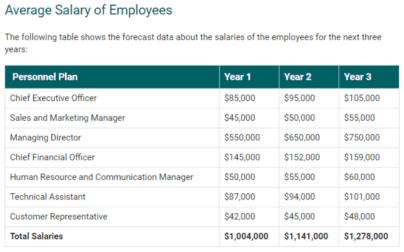
If you need to hire employees or a travel agent, emphasize how many individuals you will need and how much you will pay them.
This can provide brief details to the investors and help them understand what exactly you plan to staff your agency and pay your employees.
If applicable, you can also design an organizational chart for your travel agency. This can help you demonstrate who your key members are and what roles they serve in your travel agency.
Now, it’s time to develop an in-depth look into the day-to-day functions of your travel agency. Paint a picture of seamless operations and ensure that your business runs smoothly.
Describe the entire operational cycle of the tour business, including staffing, how bookings are managed, customer service procedures, technology used, and safety measures for handling unforeseen circumstances.
Include the below subsections in your travel agent business plan operations section:
Highlight the number of employees required, and opening hours, and briefly outline the responsibilities of each team member and training programs. Refer to the below example written using Upmetrics AI assistant:
From pre-travel assistance to emergency response, prioritize customer satisfaction, efficient techniques, and effective client communication to ensure a positive and stress-free travel journey.
Explain what kind of equipment & technology you will need to run your travel agency. Include a brief idea of how you will reach some travel agency milestones and look forward as your business grows.
You might consider below things:
Currently, you are in a business planning stage, but dedicating some time to putting together the most realistic financial projections is very crucial.
Having a well-structured and in-depth travel agency financial plan will help you show the tentative spending as well as the revenue forecasts and budgets if your travel company is seeking funding from investors.
In this section, you will need to make a few assumptions that will greatly affect the financial statements of your agency. Take a look at the below table to make important assumptions:
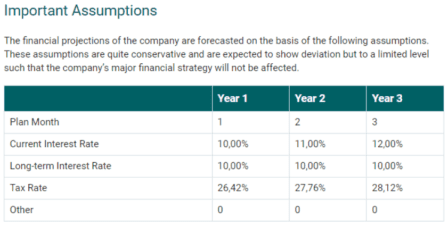
Mention all the below financial aspects in your travel agency business plan:
From the above financial statements, you can identify the startup funding needs and evaluate the funding resources for your agency, such as bank loans, angel investors, crowdfunding, or personal savings.
Well, keeping a realistic financial report in your hand not only helps you demonstrate your agency’s fiscal health but also emphasizes its sustainability.
However, calculating all the financial elements from scratch can be overwhelming. But don’t worry; consider Upmetrics’ financial forecasting tool.
All you have to do is fill in all the details you have and let the tool calculate financial factors, and create visual reports for you. No manual data entry, placing Excel formulas, or designing graphs—nothing.
Here’s an example of a projected balance sheet for the next 3 years using Upmetrics:
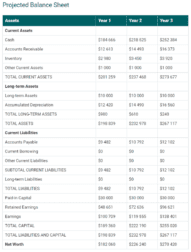
To create automatic financials for your own business plan, we recommend Upmetrics. Create your own business plan.
Need help writing your travel agency business plan from scratch? Well, here you go; download our free travel agency business plan template now and get started.
This modern, user-friendly business plan template is specifically designed for travel agencies. With a step-by-step guide and example, it helps you write a professional plan without missing any crucial steps.
Simply import data into your preferred editor and start writing!
The Quickest Way to turn a Business Idea into a Business Plan
Fill-in-the-blanks and automatic financials make it easy.
Finally! With the help of our sample business plan template, you know how to write a travel agency business plan. So, you are one step closer to starting your travel agency business confidently- pretty exciting, right?
But you know what else is more exciting? Your business planning process can be even smoother than this. Yes, you heard it right; it’s possible with the help of Upmetrics AI Assistant.
There are various online platforms where you can find free travel agency business plan templates. Consider a reputable business planning website—Upmetrics, which offers free templates to help you get started.
A comprehensive travel agency business plan should include below key components:
It is advised to regularly update your travel agency business plan to reflect changes in the market, industry trends, and business growth. Review and update your plan at least once a year or more often if there are significant changes in your business.
Make sure that you include the following financial factors in your travel agency business plan: